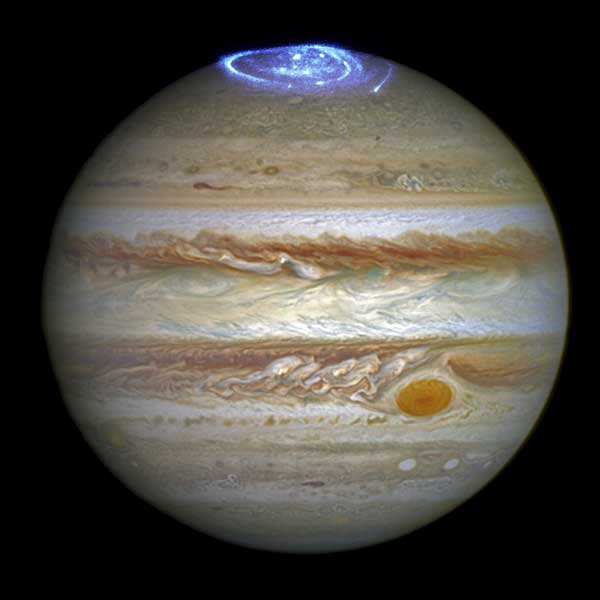 |
|
Auroras created by high-energy particles are seen on a pole of the planet Jupiter in a NASA composite of two separate images taken by the Hubble Space Telescope. [Photo/Agencies] |
Jupiter's immense gravity also diverts many asteroids and comets from potentially catastrophic collisions with Earth and the rest of the inner solar system.
"We are learning about nature, how Jupiter formed and what that tells us about our history and where we came from," said Juno lead scientist Scott Bolton, with the Southwest Research Institute in San Antonio.
NASA expects Juno to be in position for its first close-up images of Jupiter on Aug. 27, the same day its science instruments are turned on for a test run.
Only one other spacecraft, Galileo, has ever circled Jupiter, which is itself orbited by 67 known moons. Bolton said Juno is likely to discover even more.
Seven other US space probes have sailed past the gas giant on brief reconnaissance missions before heading elsewhere in the solar system.
The risks to the spacecraft are not over. Juno will fly in highly elliptical orbits that will pass within 3,000 miles (4,800 km) of the tops of Jupiter's clouds and inside the planet's powerful radiation belts.
Juno's computers and sensitive science instruments are housed in a 400-pound (180-kg) titanium vault for protection. But during its 37 orbits around Jupiter, Juno will be exposed to the equivalent of 100 million dental X-rays, said Bill McAlpine, radiation control manager for the mission.
The spacecraft, built by Lockheed Martin, is expected to last for 20 months. On its final orbit, Juno will dive into Jupiter's atmosphere, where it will be crushed and vaporized.
Like Galileo, which circled Jupiter for eight years before crashing into the planet in 2003, Juno's demise is designed to prevent any hitchhiking microbes from Earth from inadvertently contaminating Jupiter's ocean-bearing moon Europa, a target of future study for extraterrestrial life.